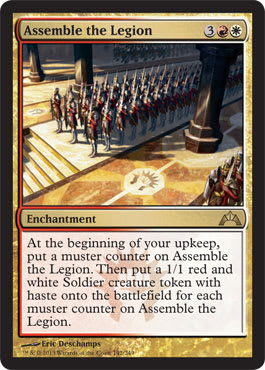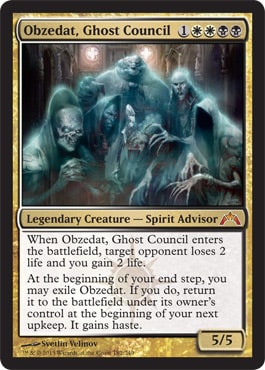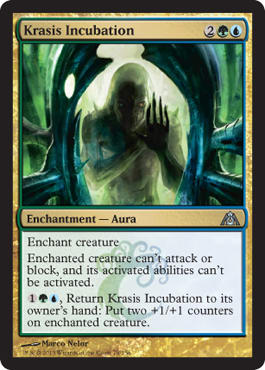I knew the moment I finished the event that I wanted to take a look back on what had just transpired. At that moment, after sixteen rounds of Magic and three Drafts across two days, I had neither time nor energy, but the outcome was worth examining. My team ended up 12–4, finishing in fourteenth place, but we would have finished between fifth and eighth if we had won our last round. While being so close to a truly big finish and missing is always disappointing, I can’t say that I am dissatisfied with the outcome of the event. So, let’s take a look back, and we’ll start from the very beginning, which, I hear, is a very good place to start.
Pre-Event
Team-Building
I knew I wanted to play the event the moment it was announced. This meant, of course, finding a team, but not just any team. I saw one of two reasonable goals for the team I was looking to establish:
- Make a deep Day 2 run; set the goal at winning the entire event.
- Enjoy myself to the utmost; play with people whom I enjoy hanging around with, and if we win, so much the better.
These two goals are not mutually exclusive, but definitely, the people I enjoy hanging around most at my local store are not the best Magic players there; thus, there was some level of conflict.
I determined that the type of team I would be looking for would be determined by a single factor: whether I ended up with Jonathan Pearlman on my team. Jon is one of the best Magic players I know, and we get along reasonably well. I also figured he’d probably be available for the event because he doesn’t play as regularly as most of the other players in the community. Long story short, Jon and I ended up on a team with our mutual friend Alex Lasky.
Preparation
I knew that I wanted to prepare for the event, but I really decided to step up my preparation once I realized I would be on a team with Jon—and thus actually attempting to win the event instead of setting my primary goal at goofing around and having fun. I played in a variety of Sealed events just looking to get practice building Sealed pools, and I think I got pretty good at it.
Draft was a different story. I wasn’t able to draft as much as I wanted and thus felt slightly underprepared for that portion of the event. I’d learned what I felt were the basics, and I was counting on my own natural abilities to adapt on the fly to pull me through the Day 2 Drafts should we make it that far.
All in all, I was satisfied with my preparation for the event.
Day 1
The Build
We opened our pool and saw an Obzedat, Ghost Council along with other good W/B cards, and we immediately set aside W/B as a deck and gave it to Alex Lasky. I disagreed with this decision based upon my experience in this format, but I didn’t say anything. In retrospect, I am unsure this was correct, and without the pool in front of me, I can’t justify my own feelings that perhaps abandoning Obzedat would have produced better overall decks.
The next decision was where I stepped out. I believed that the best way to drive deck-building was by mana. Our Guildgates were as follows: three Golgari, one Gruul, one Orzhov, one Izzet, one Boros, and one Azorius. We also had a Godless Shrine, a Prophetic Prism, and a Chromatic Lantern. I don’t remember our Cluestones exactly, but I remember we had five or six with two Rakdos Cluestones, at least one Simic, and one Azorius as well.
The Guildgates in particular were suggestive of a midrange Jund deck with our two Saruli Gatekeepers and two Ogre Jailbreakers as an option, and this is where I started. However, that left a blue deck that just didn’t have anything exciting and no low curve. This was what was causing the biggest problem in our build.
While the mana suggested B/G as a base, I soon retooled the deck to be a powerful, aggressive, R/G base splashing black. This ended up looking much better, and I called Jon, who was struggling with the blue deck, over to take a look. After a few minutes, he said he liked the deck and wanted to play it. At this point, Jon asked me about the remaining deck, and I said, “I’ll make it work.” At the time, I had absolutely no idea what I would do, as most of the 2- and 3-drops were in the other two decks, and the remaining mana looked abysmal, but I also knew that neither of them would be comfortable playing whatever deck came out of the remaining cards, so I just had to bite the bullet and figure it out.
I eventually settled on a build involving the five non-Golgari Guildgates. It was base-W/U and splashed both green (Shambleshark, Vitu-Ghazi Guildmage, two Saruli Gatekeepers, and Krasis Incubation) and red (Tajic, Blade of the Legion and Boros Battleshaper). Thus, we were set up to battle.
Ten Rounds of Magic
I’m not going to go into detail, but suffice it to say I was favored in my Round 8 match against Kar Yung Tom (which would have won our team the Round 8 match), but I was unlucky, and I believe I could have won Game 1 of my Round 10 match against Eugene Harvey (which, given I won Game 2, would have given us the match in that round as well). I have no justification for my own feelings on the Round 10 match, though, and perhaps Eugene was in a better position than I assessed.
I performed about as well as can be expected with the deck I was handed, and despite my grumbling, I was reasonably happy with my contributions to the team on our way to an 8–2 Day 1 performance.
Day 2
Drafting
We outdrafted our opponents in both the first and second Drafts. The third was significantly closer, as we were against Alexander Hayne’s team, but I still believe we were advantaged after the Draft in that one as well. Even so, we only managed a 4–2 record in Draft, going 2–0, 1–1, and 1–1.
Playing
I don’t really have much to talk about here. I feel that more of my interesting decision-making happened during the Draft portion.
Looking Back on Success
This event proved two things to me:
- When playing at my best, I can compete with the best players in the world.
- I can still play well in the later rounds of long events.
This naturally begs the question: What allowed me to succeed at this event, and how can I duplicate it for future events?
In the end, my mindset was significantly better during this event than during most other events I attend, but why was that the case? I came to the following conclusions:
- I put an extraordinary amount of pressure on myself, not only to win, but to play well. Mistakes bother me, and I often dwell on them. I have an easier time setting them aside when I win, but they come back quickly.
- I play extremely well when I am focused, but if my focus starts to slip, my play level drops precipitously.
Here are some examples, all from Day 2.
During the second Draft, I first-picked a Rubblebelt Maaka over a Krasis Incubation. I was aware that Krasis Incubation is a much better card (I had one in my Sealed pool that was very strong), but I didn’t want to commit to Simic right away, and Rubblebelt Maaka was a very good card that allowed me to stay open. This seemed to be an acceptable choice, as I picked a Turn // Burn next.
At this point, I was presented with Beetleform Mage versus Tithe Drinker. To me, this pick indicated that Orzhov and Simic could well both be open, as both cards are very strong, and this is where I made a mistake. For me, the correct pick is clearly Tithe Drinker, but I picked Beetleform Mage. Let’s take a look at why.
Pros:
| Beetleform Mage | Tithe Drinker |
|---|---|
| R/U/G > Borzhov | Extort |
| Evasion | Speed |
| Size | Never useless |
| Flexibility | Good in aggressive or controlling decks |
| Strong in midrange archetypes | Orzhov is a stronger guild. |
Tithe Drinker is significantly better for me because it suits my play style. I am not very good at midrange archetypes because they require me to walk a line between playing aggressively and playing reactively. I can do either very well, but transitioning from one mindset to another takes me a bit longer than most players. Tithe Drinker is a card that very much suits my play style, and I loathe to pass it, but I did. That already made me unhappy. Two picks and two Tithe Drinkers later, I was officially on tilt. Orzhov was open, and I could have been playing a deck with three Tithe Drinkers in it.
I am unsure of how much this decision affected me during the Draft, but I am sure that it caused me to play suboptimally at the start of the first round of play. I ended up losing my first match in the Draft, as did my team. I made a really bad attack in Game 1 when I really just wasn’t thinking things through. Thus, my lack of focus ensured that I lost that game.
Leading up to the second Draft, I had drafted and played a very strong Orzhov deck. I claimed I was unhappy with it, but that was more me grumbling than actually thinking the deck was bad. Looking back now, I think that my success in the first Draft produced a sense of complacency that I was unable to completely overcome.
My process for deciding on Rubblebelt Maaka over Krasis Incubation was unusual. It was the first time in this Draft format when I recall being afraid of color commitment. It is very common for me to take strong two- and three-color cards in Dragon’s Maze and be quite happy. Thus, my choice of Rubblebelt Maaka was against my own tendencies and preferences to begin with.
I didn’t feel particularly unfocused at the start of the Draft, but my decision-making within the Draft indicated that I was not using my preparation and thinking as clearly as I could have been. These sorts of lapses in judgment have occurred in the past when my focus wavers, and they cause me to make very basic mistakes.
This Draft was simply the first instance when I observed the same sort of thing happening in a situation where I felt good at the time, proving that if my head is not in the game, I’m prone to basic mistakes such as not taking into account my preparation and play style.
All in all, much of my success in Providence stemmed from my ability to manage my mindset, and for that, I have to credit two things:
- The team nature of the event removed much of the pressure I place on my own shoulders to win and play well, which allowed me to perform more optimally.
- My teammates were there to help manage my tilt and disappoint. Their support and reassurance helped me handle my own frustration within the event.
Providence proved to me the importance of not only your own ability at playing Magic, but also your mindset while playing the game. Magic is a difficult game, and being able to perform consistently at peak level is also extremely important. I think one of the greatest strengths of players such as Shuhei Nakamura is simply eliminating these lapses. Providence proved to me that in order to succeed in large events, managing my own mental state during the event is just as crucial as my preparation and my own abilities within matches.

























